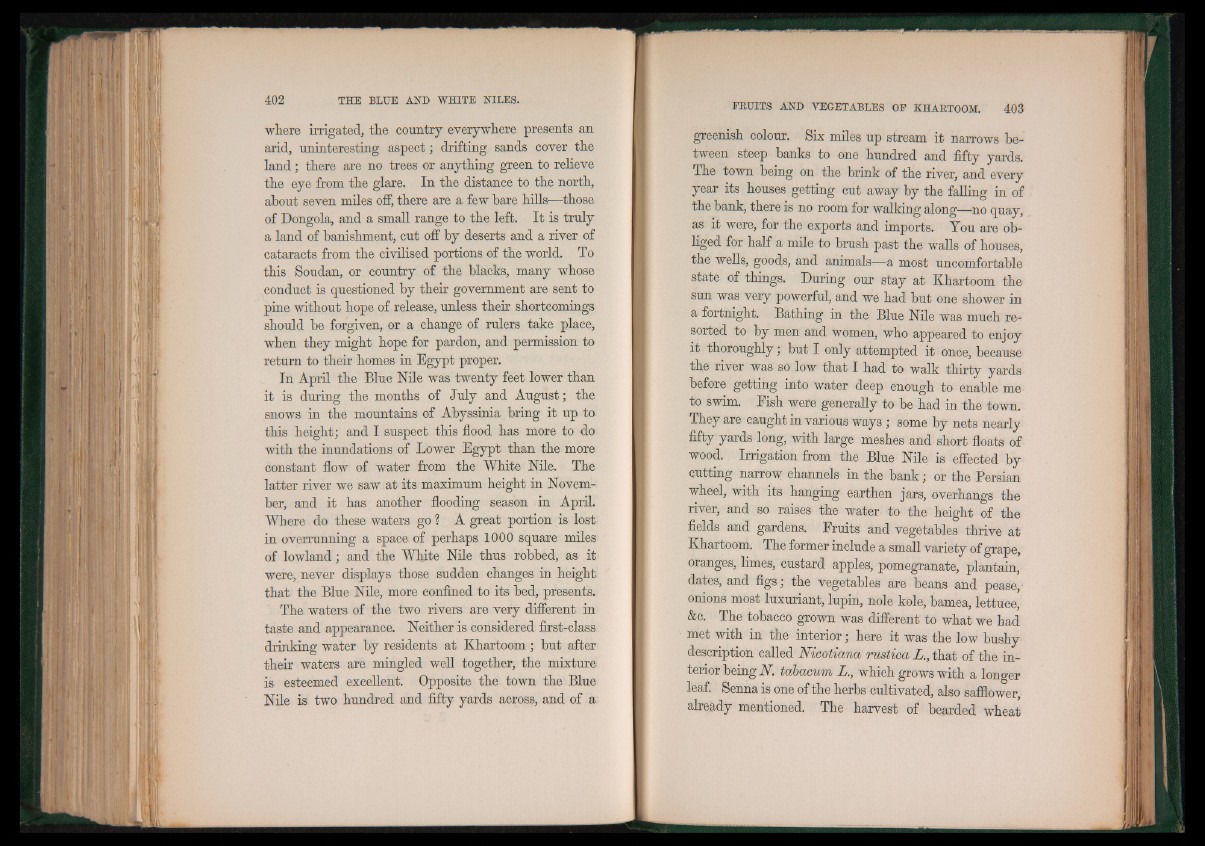
where irrigated, the country everywhere presents an
arid, uninteresting aspect; drifting sands cover the
land; there are no trees or anything green to relieve
the eye from the glare. In the distance to the north,
about seven miles off, there are a few bare hills—those
of Dongola, and a small range to the left. It is truly
a land of banishment, cut off by deserts and a river of
cataracts from the civilised portions of the world. To
this Soudan, or country of the blacks, many whose
conduct is questioned by their government are sent to
pine without hope of release, unless their shortcomings
should be forgiven, or a change of rulers take place,
when they might hope for pardon, and permission to
return to their homes in Egypt proper.
In April the Blue Nile was twenty feet lower than
it is during the months of July and August; the
snows in the mountains of Abyssinia bring it up to
this height; and I suspect this flood has more to do
with the inundations of Lower Egypt than the more
constant flow of water from the White Nile. The
latter river we saw at its maximum height in November,
and it has another flooding season in April.
Where do these waters go ? A great portion is lost
in overrunning a space of perhaps 1000 square miles
of lowland; and the White Nile thus robbed, as it
were, never displays those sudden changes in height
that the Blue Nile, more confined to its bed, presents.
The waters of the two rivers are very different in
taste and appearance. Neither is considered first-class
drinking water by residents at Khartoom; but after
their waters are mingled well together, the mixture
is esteemed excellent. Opposite the town the Blue
Nile is two hundred and fifty yards across, and of a
greenish colour. Six miles up stream it narrows between
steep banks to one hundred and fifty yards.
The town being on the brink of the river, and every
year its houses getting cut away by the falling in of
the bank, there is no room for walking along—no quay,
as it were, for the exports and imports. You are obliged
for half a mile to brush past the walls of houses,
the wells, goods, and animals—a most uncomfortable
state of things. During our stay at Khartoom the
sun was very powerful, and we had but one shower in
a fortnight. Bathing in the Blue Nile was much resorted
to by men and women, who appeared to enjoy
it thoroughly; but I only attempted it once, because
the river was so low that I had to walk thirty yards
before getting into water deep enough to enable me
to swim. Fish were generally to be had in the town.
They are caught in various ways ; some by nets nearly
fifty yards long, with large meshes and short floats of
wood. Irrigation from the Blue Nile is effected by
cutting narrow channels in the bank; or the Persian
wheel, with its hanging earthen jars, overhangs the
river, and so raises the water to the height of the
fields and gardens. Fruits and vegetables thrive at
Khartoom. The former include a small variety of grape,
oranges, limes, custard apples, pomegranate, plantain,
dates, and figs; the vegetables are beans and pease,
onions most luxuriant, lupin, nole kole, bamea, lettuce,
&c. The tobacco grown was different to what we had
met with in the interior; here it was the low bushy
description called Nicotiana rustica L., that of the interior
being N. tabacv/m L., which grows with a longer
leaf. Senna is one of the herbs cultivated, also safflower,
already mentioned. The harvest of bearded wheat